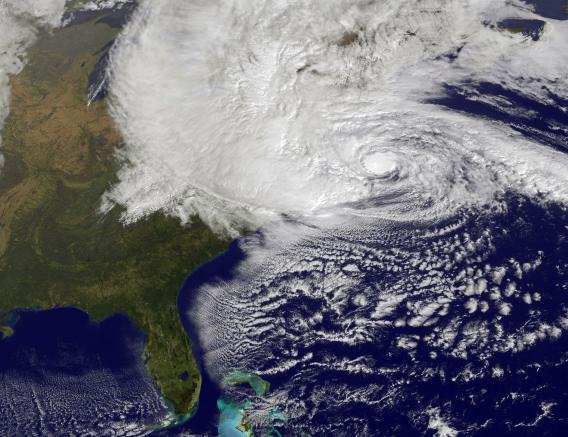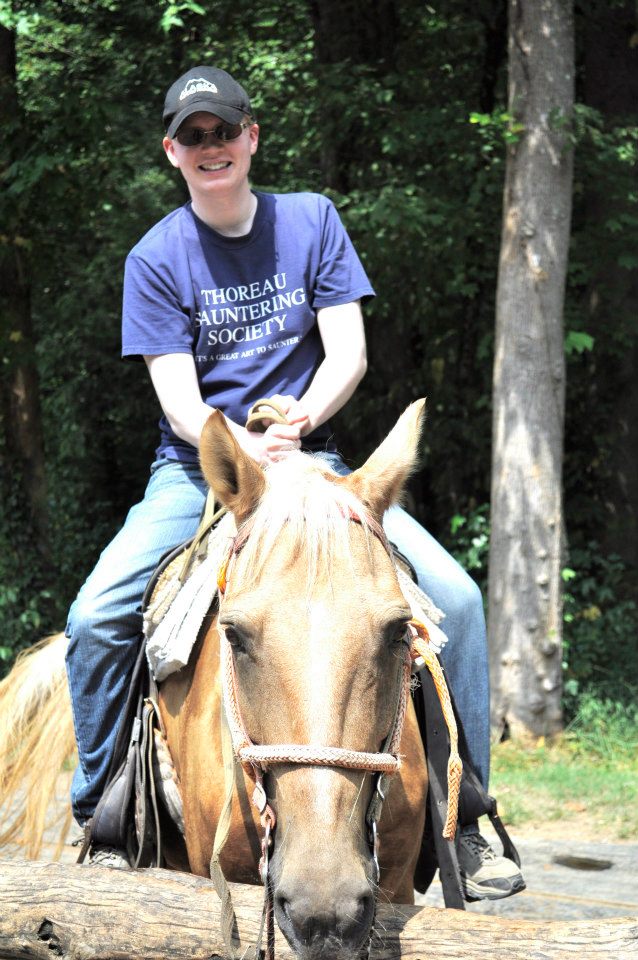Introducing the Unbound Nov 2012–Jan 2013 issue “Hope for Eco-Activists: Discovering an Environmental Faith” - A collaborative issue of Unbound and Presbyterians for Earth Care examining the relational and spiritual foundation of a life devoted to sustainability and environmental justice. This issue will “roll out” over a period of several weeks and we will be highlighting articles by PEC leaders as they become available! Check out the introduction to the issue and stay connected for more! By Patrick David Heery, Managing Editor
 |
| Hurricane Sandy left many feeling doubtful about the viability of environmental hope |
This is an article about environmental hope. These days, in the wake of Hurricane Sandy, the words “environmental” and “hope” do not often go together. But actually, they’ve been divorced for many years. I grew up in the ‘80s and ‘90s hearing about the destruction of rainforests, species extinction, and any number of apocalyptic visions due to climate change. As a child, I plastered drawings around my neighborhood with great spirals of smoke consuming the earth (I had recently seen the films FernGully and Medicine Man). I scared my parents by telling them that the earth would be better off if the human race were eliminated—logical, though certainly not the vocation parents dream of for their child. I honestly wanted to make things better, but that just didn’t seem likely.
And yet, this is an article about hope. In fact, it’s an introduction to an entire journal issue about that hope.This issue asks a simple question: What gets us out of bed every morning and gives us the will to fight another day for sustainability, earth care, and eco-justice?
The environmental movement has, in large part, operated from the assumption that if we tell people just how seriously threatened the future of our planet is, they will start to care and take action. This has created a strategy of “awareness raising.” But new (and some old) theories of how people learn and develop identity-markers draw this assumption into question. Moreover, the strategy can backfire. Rather than more information serving as a catalyst, it has often overwhelmed and left many feeling powerless.
In his book, The Nature Principle, Richard Louv describes speaking to an auditorium filled with two hundred high school students—a speaker’s nightmare. He expected the typical blank stares, “gum popping, and note passing.” But what happened next surprised him: the students were paying attention. In fact, they were downright curious and excited. Louv was baffled. Afterward, a science teacher explained: It’s “simple. You said something positive about the future of the environment. They never hear that.”
Not long before Louv’s presentation, an expert on global climate change had spoken to the same group of students—and had received a very different reaction. They were bored; they couldn’t have cared less. What they heard was the typical doom and gloom message: “the planet is in big trouble (but it’s too late to save it anyway).” Young people have heard this message all their lives. They get it: the world is dying.
But Louv said something that they had not heard before. He spoke about them and “their health: a growing body of evidence showing how outdoor experiences can enhance their ability to learn and think, expand their senses, and improve their physical and mental health.” While Louv named the dire threats to the environment, he presented these deteriorating conditions as a rallying cry for “new sources of energy; new types of agriculture; new urban design and new kinds of schools, workplaces, and healthcare… whole new careers.”¹ Without downplaying the seriousness of the earth’s environmental problems, Louv gave a message of hope that spelled out alternative practices and policies that are already being implemented in communities across the world.
“You said something positive about the environment. They never hear that.”
It is not enough to tell people how bad things are. That negative motivation only goes so far. People need more. And they need more than “awareness.” David Siegenthaler, who writes in this issue about deep ecology, says that true motivation begins with “first-hand contact” or experience that elicits awe and, yes, love. “Understanding,” he writes, “follows love.” When you love something, you are willing to fight for it.
In the spirit of that loyalty to the earth, these articles go beneath the “issues” (though they certainly engage them) and examine the relational and spiritual foundation of a life devoted to sustainability and environmental justice. They seek a coherent way of life and theology manifest in all aspects of existence: human relationships, the sacraments and worship, the reading of scripture, re-connection with the earth, artistic expression, our consumer decisions, and communities that reintegrate the social categories of race, gender, age, and class.
The issue began as a project of Unbound, Presbyterians for Earth Care, and Presbyterian Environmental Ministries. But it soon grew and took on new ecumenical, and then interfaith, dimensions. It turned out that people were excited to write on this subject. In fact, we received so many submissions that we have decided to roll out the issue over a period of several weeks, rather than post all the articles at once and overwhelm.
You will get to hear from GreenFaith Fellows, trained in North America’s only comprehensive interfaith education program designed to turn clergy and laity into religious-environmental leaders; from scientists and ecologists; from artists, musicians, and poets; from ecumenical young adult movements like the National Council of Churches’ Eco-Justice Program and the World Student Christian Federation; from participants in the Rio+20 United Nations Conference on Sustainable Development; from pastors and theologians; and from eco-justice community organizers.
We would claim that the range of articles shows how hope becomes redemptive possibility. We might say that a “burning man” aesthetic becomes a “green man”—and woman—ethic that is not consumed (or about consumption); and that cooperation becomes part of the earth’s re-enchantment. And perhaps ultimately we pray that disaster reconstruction helps redirect the human storms of violence and wasted energy. Here is a sampling of the articles:
- Shantha Ready Alonso of the NCC helps us understand what young people crave and how the environmental movement could answer that need.
- Larry Rasmussen, the Reinhold Niebuhr Professor of Social Ethics Emeritus at Union Theological Seminary in New York City, writes about the Eucharist and an environmental sacramental theology, drawing upon his new book, Earth-Honoring Faith.
- Rabbi Janet Madden describes how gardening offers a sacred space (even in pots and buckets) and a sacred time for being together, particularly, on Shabbat.
- William Seaman introduces us to the deep wonder of our world’s threatened oceans, and maps out possibilities for recovery.
- Holly Hallman and Abby Mohaupt lead the rally cry for eco-feminism, a movement and philosophy that understands the oppression and objectification of women and of the environment as interconnected and mutually supportive.
- Community organizer Clare Butterfield examines racial and class privilege embedded in the environmental movement, and tells us how one urban interfaith eco-justice organization in Chicago is working to change that.
- Genny Rowley shares her research on congregational environmental organizations: how they happen and why they work.
- Neddy Astudillo reframes our understanding of creation care from the perspective of her Latino/a ministry and context, seeking to integrate and transcend the limitations of stewardship, justice, and spirituality.
- Stan Adamson introduces deep ecology and nature deficit disorder, and tells us how immersion in the natural world can become a spiritual discipline.
- Lauren Wright shares art inspired by her Young Adult Volunteer (YAV) and eco-steward year in the wetlands of southern Louisiana.
Together, these articles reveal a changing environmental movement—one that is less about warding off disaster or accruing benefits, and more about a vision of local, sustainable communities gathering around farmers’ markets, contemplative hikes and sea voyages, urban re-design, and creative political action. It is a participatory, relational vision reframing old questions like “How do we stop environmental degradation?” into “How do we create a different kind of society?” It is a movement based on hope and the presentation of practiced alternatives that go beyond mere stewardship of resources (e.g. recycling) and address systems, root causes, and issues of privilege. That hope, for many, is based in a sacred experience of God’s creation.
The systematic implications of movements like these remain to be seen, but if enough communities like these emerge—and if they connect—we may have more than hope. We may have living alternatives that resist the momentum toward devastation. Disaster still threatens—we will see increasing numbers of grim storms—but we will also see more of a future that is not heart-breaking but hope-bearing.
Check out the Nov 2012–Jan 2013 Unbound issue, “Hope for Eco-Activists: Discovering an Environmental Faith”
_________________________
Notes
[1] Richard Louv, The Nature Principle: Human Restoration and the End of Nature-Deficit Disorder. Chapel Hill, North Carolina: Algonquin Books of Chapel Hill, 2011: 282–3.
Notes
[1] Richard Louv, The Nature Principle: Human Restoration and the End of Nature-Deficit Disorder. Chapel Hill, North Carolina: Algonquin Books of Chapel Hill, 2011: 282–3.


No comments:
Post a Comment